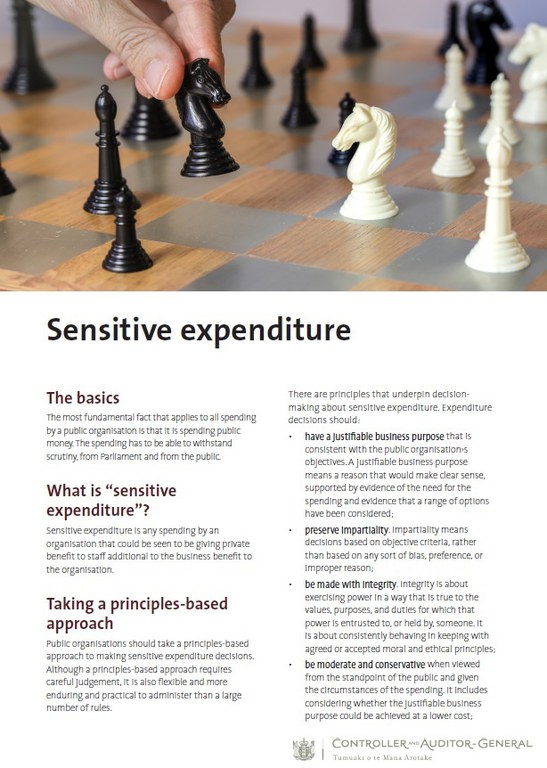Types of sensitive expenditure
Expenses when travelling
Issues about expenditure on travel and accommodation, especially by governors, chief executives, and managers, are often brought to our attention.
Travel and accommodation expenditure should be economical and efficient, having regard to purpose, distance, time, urgency, and personal health, security, and safety considerations.
Public organisations should have travel policies and procedures that:
- consider technology-enabled solutions as opposed to travel in person;
- cover domestic and international travel;
- require written approval before travel;
- provide guidance on taking annual leave, staying away over weekends, stopovers, travelling with spouses or partners, and class of travel; and
- outline the monitoring and reporting arrangements.
For more information and guidance about expenses when travelling, please see Part 5 of our good practice guide.
Entertainment and hospitality expenditure
Expenditure on entertainment and hospitality is sensitive because of the range of purposes it can serve, the opportunities for private benefit, and the uncertainty as to what is appropriate.
We expect entertainment and hospitality expenditure to be:
- subject to policies that provide clear guidance about what is an acceptable level and type of expenditure and appropriate venues (for example, on seasonal occasions, such as a Christmas function);
- provided only when it is cost-effective and appropriate for the occasion;
- subject to policies that include a general prohibition on organisations paying for alcohol, except in specific circumstances and within prescribed limits; and
- supported by appropriate documentation that includes receipts, names of parties entertained, and the reasons for the entertainment and hospitality.
Part 6 of our good practice guide has more on the issues and principles about entertainment and hospitality expenditure.
Goods and services expenditure
This relates to obtaining, disposing of, or using goods and services that are not covered by terms and conditions of employment. For more information about the different types of good and services expenditure, please see Part 7 of our good practice guide.
Staff support and well-being expenditure
Public organisations can provide for staff support and well-being in various ways. The resulting benefits should be to both the organisation and the staff.
However, a public organisation also needs to be aware that payments for staff support and well-being could be seen as paying for what are ordinarily a staff member's personal and private expenses. This could be seen as additional remuneration for the staff member. In those circumstances, the organisation needs to consider the implications for such matters as tax liability and relevant employment agreements.
For more detailed information and guidance, including the different types of staff support and well-being expenditure, please see Part 8 of our good practice guide.
Other types of expenditure
For principles and guidance on expenditure for donations, gifts, and information communications technology, please see Part 9 of our good practice guide.

